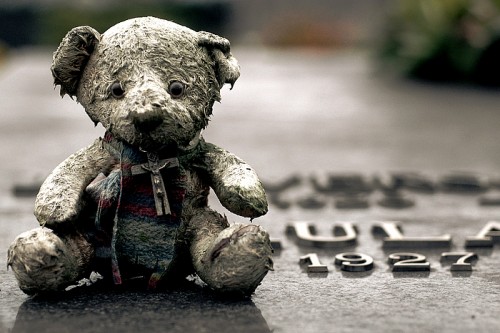Posted by Charles
In a decorous piece of invective in last Friday’s Daily Telegraph, Damian Thompson analyses the way people express grief today, and why:
A few weeks after the murders of the schoolgirls Holly Wells and Jessica Chapman in 2002, I stood in Soham parish church with the vicar, the Rev Tim Alban Jones. He had made an excellent impression in the media by asking the public to pray for the girls’ families while discouraging maudlin displays of “grief ”. But he’d only been partly successful. A corner of his church was piled to the ceiling with cardboard boxes full of soft toys – in memory of the dead girls.
The vicar pointed them out to me with a baffled expression. “Why do people send teddy bears?” he asked.
… … … …
As a nation we have developed an odd relationship with grief. It’s not just that we are fascinated by tragedies; we are deeply moved by our own reaction to them.
This is where those teddy bears come into the picture. The soft toys weren’t intended as comfort for the families of two horribly murdered girls. Their purpose was to provide emotional satisfaction for the people who sent them – a “personal” tribute to Holly and Jessica by members of the public who, a decade later, probably have difficulty remembering their names.
When Diana, Princess of Wales died, some critics were appalled by the “mourning sickness” symbolised by the mountains of flowers. That’s harsh, given that the public felt that they knew Diana. But there’s no getting away from it: some of those bouquets gave off the same aroma of narcissism as the teddies.
Although the vicarious grief over Diana was unusually intense, it was a classic demonstration of post-religious spirituality. The same goes for the outpouring of sympathy for Fabrice Muamba, a footballer few people had heard of before he collapsed.
Modern Westerners, including Christians, no longer believe in the supernatural in the taken-for-granted fashion of our ancestors. Confronted by major life events, we find solace in our own compassion. Visit a modern church, and you’re likely to find a smug congregation celebrating itself: a very secular impulse. And why did Ken Livingstone blub this week? Because he’d seen a film about his own benevolence – probably the closest he has ever come to a religious experience.



The infinite regress of psychological egoism:
“All men desire only satisfaction.”
“Satisfaction of what?”
“Satisfaction of their desires.”
“Their desires for what?”
“Their desires for satisfaction.”
“Satisfaction of what?”
“Their desires.”
“For what?”
“For satisfaction”—etc.
I’m not sure that I agree with the journalist’s assessment of the motivation here. People like to put things in graves, not necessarily because they have any kind of belief in an afterlife (I am far from convinced that garve goods in the distant past were necessarily or primarily to do with afterlife expectations, but that’s a totally different issue.) People feel powerless in the face of death. They want to be able to do something about it, to make it better, to blame someone or something. Actually that is too much of an assumption…that is how I feel in… Read more »